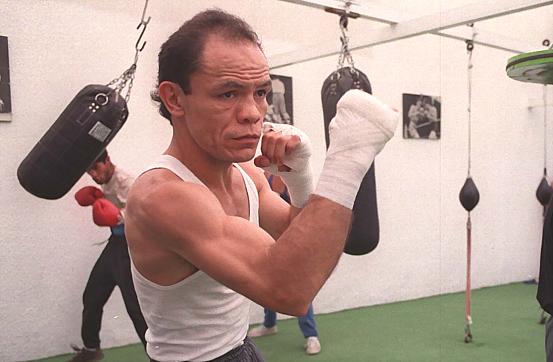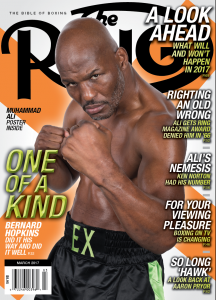Best I Faced: Daniel Zaragoza

Daniel Zaragoza was one of the best road warriors of the late-1980s and much of the ’90s. Never the most talented fighter around, he used his considerable guile and resolve to win world titles, initially at bantamweight, though junior featherweight was where he came into his own.
Zaragoza was born in Mexico City and came from a boxing family. His father Agustin was a good boxer; he had 12 children and taught his five sons how to box. Daniel’s older brother Agustin Jr. won a bronze medal at the 1968 Olympics. Daniel won the Mexican Golden Gloves in 1978 and competed internationally; the pinnacle came when he represented Mexico at the 1980 Olympics, though he lost before the medal round. He left the unpaid ranks with a record of 54-4.
In the fall of 1980, Zaragoza made the transition to the professional ranks. Within two years, he’d won the Mexican National title at bantamweight, then retained his crown 10 times before he met Fred Jackson for the vacant WBC belt in Aruba.
A close fight ensued, when Jackson was disqualified for what was deemed an intentional headbutt that cut Zaragoza’s forehead.
Zaragoza would lose the championship three months later in his first defense against Miguel Lora by unanimous decision.
He elected to step up to junior featherweight, losing his first fight in the new weight class against budding Australian superstar Jeff Fenech.
Just as he would countless times in his career “El Raton/The Mouse” regrouped and, in 1988, he stunned legendary Carlos Zarate, stopping his fellow Mexican in the 10th round to claim the vacant WBC junior featherweight crown.
Interestingly, Zaragoza was trained for the Zarate fight by Nacho Beristain, becoming the Hall of Fame trainer’s first world champion.
When Beristain opened his own gym, a few years later, he combined the surnames of Gilberto Roman – another of his world champions – with Zaragoza and called the gym “Romanza.” The gym went on to forge many elite champions, including Juan Manuel Marquez, his younger brother Rafael, Humberto “Chiquita” Gonzalez and Ricardo Lopez.
Zaragoza would make five successful defenses, decisioning Paul Banke and Chan Young Park before losing to Banke in a rematch.
While Zaragoza sat on the sidelines, the WBC title changed hands several times, before he regained it, eking out a split decision over Kiyoshi Hatanaka. Zaragoza would win a rubber match against Banke, before again losing the title in France to Thierry Jacob.
A two-fight series with Tracy Patterson followed (D 12 and L TKO 7 due to cuts) and it appeared that the Mexico City native was ready to be put out to pasture.
However, like all top fighters, Zaragoza had one final hurrah left. After drawing with Hector Acero-Sanchez in June of 1995, he beat the skilled Dominican-born fighter five months later to claim the WBC title for a third time.
Looking back, he considers that to be his proudest moment in his career.
“Conquering my fourth world title,” Zaragoza proudly told RingTV.com through Victor Silva. “Being 37 years old. I think I am the oldest fighter to win the WBC title at junior featherweight.”
He went on to make four defenses, edging, among others, then-unbeaten Wayne McCullough (SD 12) and Joichiro Tatsuyoshi (TKO 11, UD 12) in Japan in front of the popular stars home fans.
Months shy of his 40th birthday, Zaragoza would fight for the final time, losing his title, via 11-round KO, against a young up-and-coming Erik Morales. He exited the sport with a very respectable 55-8-3 (28 knockouts) record.
The Mexico City-born fighter engaged in 22 world title fights in his 17-year pro career; incredibly none of them took place in his homeland.
Zaragoza will be remembered as a teak-tough blood-and-guts warrior, who used his southpaw stance and jab to fend off opponents, along with an impressive work rate.
The grizzled veteran enjoyed several highlights during his career.
“My biggest victories were being inside boxing for 20 years, three years in amateur boxing and 17 professionally, and having fought at the Olympic Games,” he said. “During my professional career, the things that I enjoyed the most were winning my world championships and now I am really proud of being a Hall-of-Famer in Los Angeles and in Canastota (New York).”
Zaragoza was inducted into the International Boxing Hall of Fame in 2004.
Today, Zaragoza, 59, remains involved in boxing, he runs his own gym the Zaragoza Boxing Hall, he also manages amateur and professional fighters. He is married and is a proud father and grandfather.
He graciously agreed to speak to RingTV.com about the best he faced in 10 key categories.
BEST JAB
Carlos Zarate: Loyal to his school style, he had a wonderful left hand.
BEST DEFENSE
Hector Acero-Sanchez: He had wonderful waist movement and he used also some clever side steps. He didn’t care about offering a show or about the fans; he only cared about his physical integrity.
BEST CHIN
Wayne McCullough: He was an offensive fighter, he wasn’t stopped by anything, he was always going forward looking for the victory due to his resistance.
FASTEST HANDS
Tracy Patterson: His right hand was explosive; you were not able to see it. Once you felt the first punch you would instantly feel the next ones.
FASTEST FEET
Seung-Hoon Lee: I allowed him to use all the ring; he had space to move away from me. His attack did not have a specific strategy.
SMARTEST
Erik Morales: He knew to wait for the perfect moment to conquer his first championship despite being that young.
STRONGEST
Jeff Fenech: He had great strength, despite weighing only 122-pounds.
BEST PUNCHER
Paul Banke: He never stopped throwing punches from all angles. He didn’t care if he received some (in return as long as he got his shots off).
BEST SKILLS
Morales: He was undefeated when I faced him; he was really strong and tall for the division.
BEST OVERALL
Morales: Because of his great (career) trajectory and for having conquered titles in four weight classes.
Victor Silva helped co-ordinate and translate this feature. RingTV.com appreciates his assistance.
Questions and/or comments can be sent to Anson at [email protected] and you can follow him on Twitter @AnsonWainwright.
Struggling to locate a copy of RING magazine? Try here or…
SUBSCRIBE
You can subscribe to the print and digital editions of RING magazine by clicking the banner or here. You can also order the current issue, which is on newsstands, or back issues from our subscribe page. On the cover this month: the recently retired all-time great Bernard Hopkins.
















